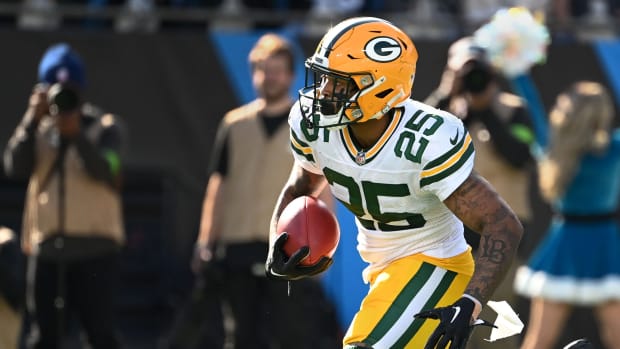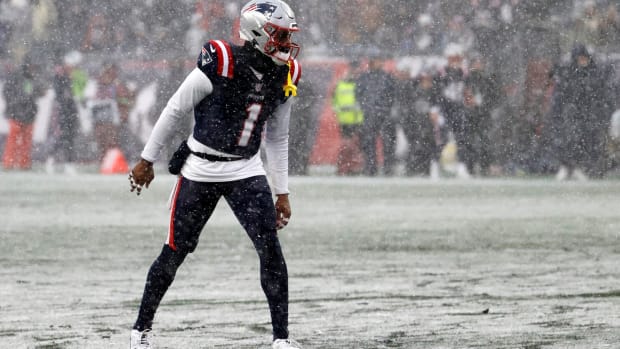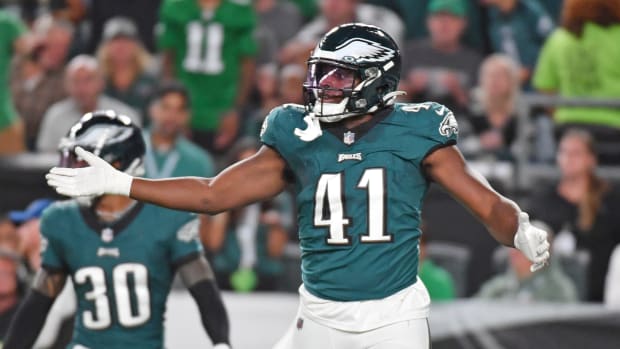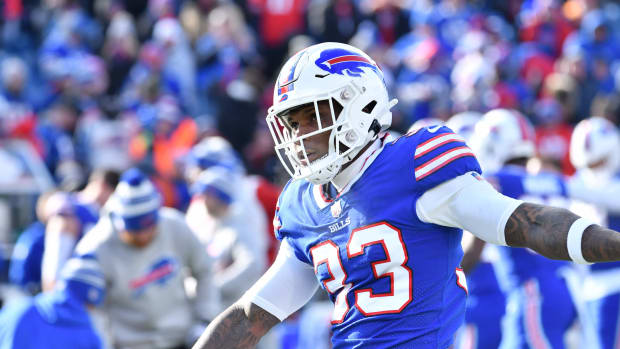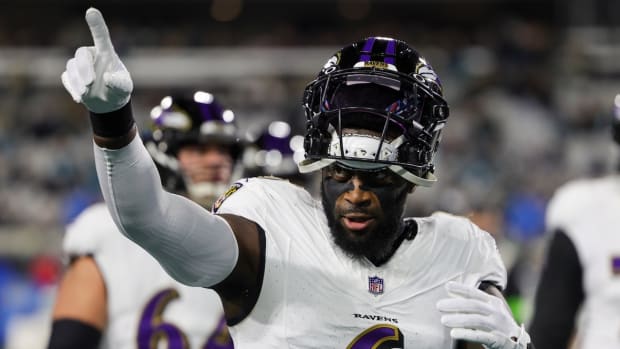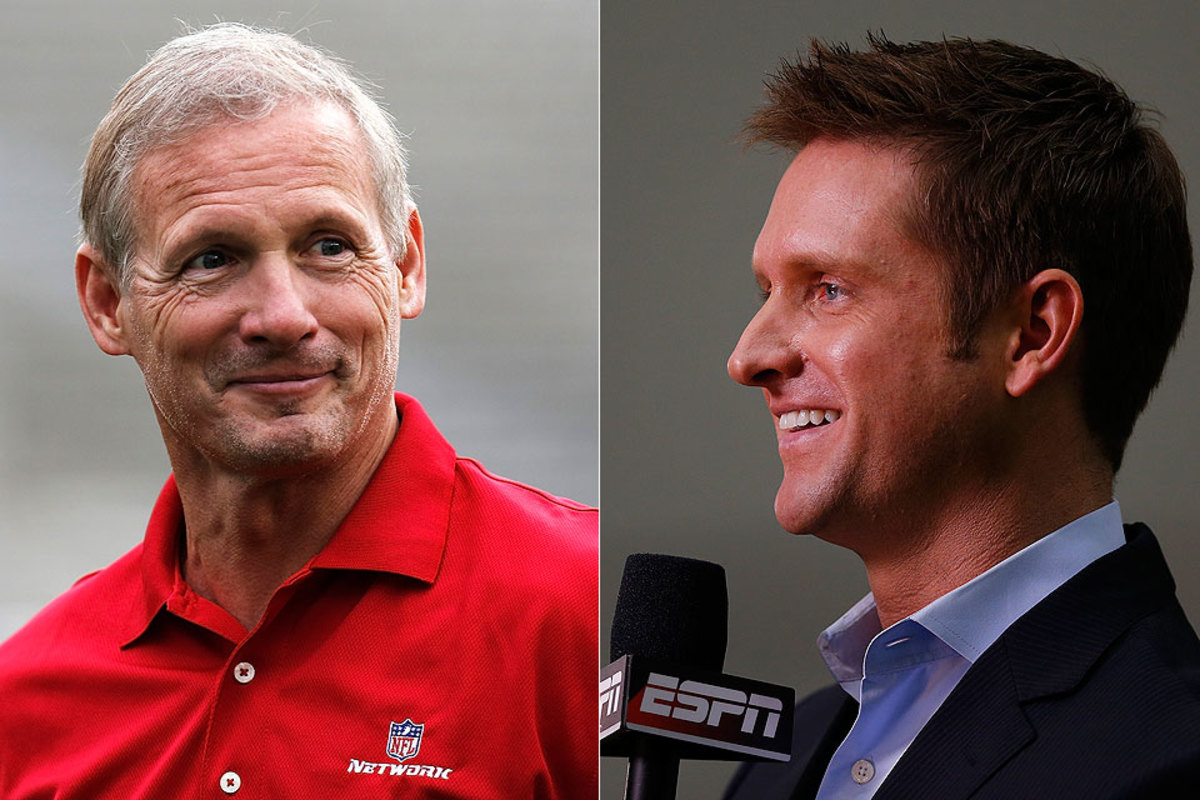
A Mayock & McShay Q&A
Mike Mayock and Todd McShay, the NFL draft television gurus of the moment along with Mel Kiper, ply their trade in the comparison business. And it's become big business given how many hours ESPN (McShay and Kiper’s employer) and the NFL Network (where Mayock works) have dedicated to the event before the actual event itself on May 8-10. Both Mayock and McShay say television is the easiest part of the job; the in-person evaluation of prospects, phone calls to sources, endless hours of tape watching and research are where you make your bones. Last week The MMQB held a pro day of sorts with Mayock and McShay to get insight into their livelihood:
How do you define success in your job?
Mayock: I think first and foremost my job is to understand what all 32 teams are trying to do. I try to be the general manager for all 32. Then, if I feel like if I can match up players who fit particularly teams, to me I have had a successful draft. It is not about the mock draft. It is more how good do I feel about it. It is not externally motivated. It’s how good do I feel the Sunday after the draft that all the work I did was able to help people understand why moves were made or not made.
McShay: I don’t think it is necessarily defined on draft day. When we started this thing [college football scouting for ESPN Scouts Inc.] I tried to set it up as close as we could to what an actual college scouting department would do. I have two other guys who watch tape with me, and we go through the process as close as we can to what scouts, college directors and general managers go through. Other people are more reporters of the draft, but for me it is all about evaluating and having our own opinions—and doing it based on evaluating tape and getting the same character and durability issues that NFL teams are getting. I am more concerned about how guys play in the league three, four, five or six years down the road than I am where they get drafted. We have seen guys like Tim Tebow [1st round, Broncos, 2010] get drafted entirely too high. We see guys who fall who end up being really good players, like Andre Ellington [6th round, Cardinals] last year. I’d much rather be spot-on three or four years down the line than on draft night. A part of the job is also conveying what I am seeing to people watching online or on television. But the biggest thing is finding the guys who will have success at the next level, and I hope over time that’s how I will be evaluated and not by mock drafts.
Would you extend the draft beyond three days? Why or why not?
Mayock: I’d rather go back to the way it used to be: two days. I think from a football perspective it rewarded teams that did their homework better and were better prepared. It put more pressure on teams. Now you have an extra night. After the third round, you go home and regroup just like you do after the first round. I like when teams are on the clock and they have 10 or five minutes to make decisions, especially when it’s about making a trade. Now you have an extra night to talk about who the 33rd best player is or do we need to trade up? The pressure is off. You can reset your board. I like it when it is going crazy because the teams that have done the most preparation are the most mobile. I think it takes away some of that from those teams.
"If I can match up players who fit particular teams, to me I have had a successful draft," Mayock says. "It is not about the mock draft."
McShay: I would not. I thought it would be too long extending to three, so maybe if they extend to four I might change my mind. But I like the three-day format as is. You get the red carpet night out of the way and allow everyone to soak it in and enjoy it. Then from a team perspective you can strategize and make more phone calls. I think it makes for a more interesting second round. Then there are still some really good players on Day 3 early on. Those final two rounds I know there are not a lot of fans on the edge of their seats seeing which player their team took. So that’s why I think extended it would probably be pushing it too far.
During the whole draft process, how many prospects will you have evaluated?
Mayock: I will have seen personally at least 150 players and two or three game tapes minimum on each of those players. That doesn’t include some of the players where I will just do point-of-attack tapes or highlight reel-type stuff. I get to about five rounds where I feel pretty good because I have seen the players. The rest of it is help from people I trust from around the league. Our research department at NFL Network does a great job, and I will get a binder with over 700 players in it. I’ve done my work and I know who the players are, but it is always interesting to see how they come up with 700 names for 250 or so to get drafted.
McShay: We have 1,857 players in my database. Obviously, that’s all eligible draft prospects. I have watched tape on probably 450 o them. After one tape for the later-round free-agent guys I will decide if it is worth continuing to watch more tape or if I am better served moving on. There are also some guys we write up in May, June and August to get ready for next year that we wind up not even revisiting for whatever reason. It is a minimum of four tapes if I am going to do an evaluation of a player. That is probably four to six hours. With the quarterbacks you have to do more, I believe. I probably wind up doing eight tapes for the top 10 quarterbacks. Obviously the hours add up. But 358 was the number we came to this year.
Who is the most can’t-miss player this year, regardless of position?
Linebacker Khalil Mack is expected to go off the board very early on May 8. (Michael Conroy/AP)
Mayock: Khalil Mack from the University at Buffalo. I think he has a physical skill set that is a top-five, elite skill set. Plus, I feel like every game he plays, he plays with an edge about him. Because of that, I don’t think he has some of the traps that some of the big-name players do, people wondering whether they will show up every week or how consistent they will be. This kid was lightly recruited, he played college ball in Buffalo, and he has an edge about him because he has something to prove every week.
McShay: It may sound crazy but I will go with Jadeveon Clowney, even though there are concerns about his work ethic and those things. The more I watched and studied him, the more you come to the realization that he was dealing with things this past year that very few have had to deal with, in terms of being the most schemed-against player I have ever seen and all the media pressure and hype that came down on him. I think he learned and matured. Bottom line, I think he is just so talented. It won’t be easier [overall in the NFL], but I think it will be simpler dealing with one-on-ones. I can’t see a scenario where he flames out and is not at least a good starter in the league.
How did the draft being moved back a couple of weeks affect what you did this year?
Mayock: Not at all. To be honest with you I don’t like it, and I have not met anyone affiliated with a team that likes it, but that is today’s age. It really has not changed my schedule at all.
McShay: It killed my vacation time (laughs). Honestly it worked out well because the list of underclassman kept growing. There is a catch-up game going on with a lot of teams, and having an extra few weeks has been very helpful. I know it has been for me. I finished all 358 players on April 21 that I gave a full evaluation to, and that is 10 days later than I usually finish. With 98 underclassman it was helpful to have a little extra time. I also think now that the evaluations are done, there will be a lot of noise. I think it is too long. It has been helpful this year, but the bottom line is I think it is much better in late April than early May.
How does the week leading up to the draft compare to the previous six or seven?
Mayock: I was on the road for six weeks up until the third week of April, going to pro days. For the final two weeks it is about getting on the phone with people I respect and trust around the league to compare notes, get all my lists and everything together, and make sure I feel about good about all sides of this thing. I know when I get to New York that Monday of the draft that I will be pulled in all kinds of directions that take me away from stuff. I really have to be ready to go before I get to New York City.
"My daughter has often said that during draft season she could elope and move to China," Mayock says, "and I would not know until after the draft."
McShay: The stress level I had the first three weeks in April was the highest of the year. The vast majority of the guys, if there is no new information based on character or durability, they are not moving around. Once that is set, it really is for me just going in and doing the television. I don’t know if it is a good comparison, but you hear coaches say game day is not as stressful as the days leading up because you have figured what you want to do and now it is just go out and call plays. So it’s about conveying the message of who these players are, where they should be drafted, and most importantly, what is the best fit for the NFL.
How would your wife or children write up a scouting report for you?
Mayock: My daughter has often said that during draft season that she could elope and move to China and I would not know until after the draft.
McShay: I think my wife respects it all but sometimes she can’t wrap her finger around it.
How often do you hear from agents attempting to influence your evaluation?
Mayock: I’ve gotten to a point where I have a comfortable working relationship with agents because they know they are not going to sway me. Years ago I would get an awful lot of emails and phone calls and people saying, ‘Why did you say my guy is this,’ or ‘Let me send you some statistics.’ I think most of them know the way I work is basically that I form my own opinion and they can send me all the stats they want, but they are not getting their guy drafted higher or lower. An agent can position [a client] certain ways, but he will not help [him] get drafted higher. Most of them have given up trying to sway my opinion.
McShay: Not as much anymore. I used to get it all time. There are a few I will talk to once in a while because they have earned my trust because they give honest opinions. But I don’t return calls and emails. It has gone away as people realize I am not that interested.
How many hours of sleep do you average in the weeks leading up to the draft?
Mayock: This time of year I like to be sitting at my desk working by six in the morning. Everything is different when you are traveling, which was my schedule for many weeks. The two weeks before the draft I was up by six and there really is no clock at night for me. I work as long as I can until I am satisfied. I am usually in bed my midnight so if I am getting five to six hours this time of year I am pretty happy.
McShay: I probably average around five hours starting in December . It may be a little less in the next couple of weeks because I’ll be in Bristol and I get in at 7 or 7:30 a.m. and we are sometimes here until 10:30 p.m. or so.
You can draft one college player at any point in history off his college performance. Who would you draft and why?
Andrew Luck was one of the most pro-ready prospects in draft history. (Ben Liebenberg/AP)
Mayock: I thought the two easiest evaluations I have ever done were Peyton Manning and Andrew Luck. I would say Jim Brown would be there, and several tackles too. But I look at it like you want that franchise quarterback, and they were the two guys that appealed to me because not only did they have all the measurables, but also the intangibles that make a great quarterback.
McShay: Andrew Luck. He is the highest grade I have ever given. I started in 2003 so of all the guys I have evaluated it is Andrew Luck. There was no hole in his game. He was just as sharp mentally as he was physically. You can never predict durability but there was just nothing that stood out that you would be concerned about.
What is the best college football town for food?
Mayock: I recently had a great meal in Clemson with brisket and barbecue. It was awesome. In Columbus I had a great cheeseburger and I forget the name of the place but it was the biggest cheeseburger I have ever had. I love all the college towns because of things like the food you can get.
McShay: For food and fun, it’s Baton Rouge. Even if you are not a college football fan, if you just enjoy a good time, it’s a scene. There is nothing else like it.
How would you do on a Wonderlic test?
Mayock: I’d say plus or minus 25 to 30 out of 50.
McShay: I am nervous to take it. But I think I should. I owe it to people. But it’s not an IQ test or how smart you are. I want to take it and I’ll probably fail it.
What is the one word that describes you?
Mayock: Thorough.
McShay: Insane.



































